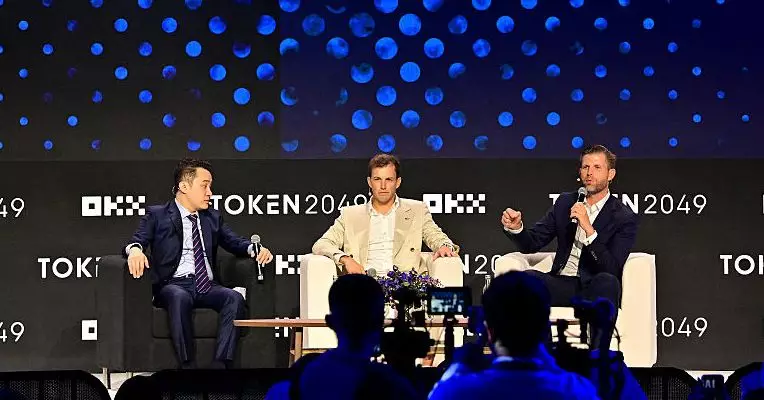The cryptocurrency market has often been a bastion of innovation and speculative enthusiasm, yet it has also become a breeding ground for intricate entanglements of wealth and power. The emergence of World Liberty Financial—a crypto company partially owned by former President Donald Trump and his family—exemplifies these complexities. As the firm sends its representatives to various global financial hubs, including a recent appearance at the Token2049 conference in Dubai, troubling questions arise about the ethical implications of such ventures.
At the crux of the company’s operations is USD1, a stablecoin introduced by World Liberty Financial. This digital currency promises to maintain a fixed value tied to the US dollar, leveraging reserves of cash and assets. While on the surface this may seem a straightforward operation, the undercurrents of influence suggest a much murkier reality. As Eric Trump and co-founder Zachary Witkoff unveiled a $2 billion partnership investment plan involving Binance—a leading cryptocurrency exchange—critics were quick to voice concerns over potential conflicts of interest.
The Mechanics of Stablecoins
Stablecoins like USD1 thrive on a foundation of regulatory trust and the promise of liquidity. Here, traditional financial principles intersect with modern cryptocurrency concepts. The idea is that for every coin issued, equivalent reserves are kept to guarantee that holders can redeem their digital currency for the expected value. World Liberty Financial’s model hinges on using collected funds to invest, not just in high-security US government bonds but also in technology that aims to revolutionize the financial landscape.
However, this innovative façade raises questions about the motivations behind significant investments, especially with high-profile entities like Binance. The layers of financial maneuvering come into play when one considers how the profits from such large-scale operations could significantly enrich the Trump family. If the company were to funnel the entire $2 billion into short-term Treasuries, resulting projections suggest annual gains in the ballpark of $85 million. The question of ethical propriety looms large—could foreign entities be effectively buying influence with the Trump administration through financial arrangements facilitated by USD1?
Ethical Quandaries and Conflicts of Interest
The intersection of crypto finance and political power doesn’t just reflect unprecedented innovation; it embodies a potential conflict-generating machine. The notion that foreign businesses affiliated with the UAE could indirectly transfer wealth to the Trump family via their stake in World Liberty Financial raises alarms about ethical governance. Critics, including monetary policy experts like George Selgin, argue that these transactions resemble a form of influence peddling, hinting at a precarious fusion of politics and profit.
The inherent risk is that foreign investments could hinder or enhance the integrity of US political processes. Stakeholders could find themselves entangled in a web of ethical dilemmas where the lines separating legitimate business practices from improper influence grow increasingly blurred. To some, these dealings call into question the role of personal wealth within public architecture, especially when an influential family stands to benefit significantly from government policies.
Market Reactions and Regulatory Oversight
As world financial markets grapple with the rise of cryptocurrencies, stakeholders are grappling with this complex ecosystem that combines digital assets, investments, and potential governmental entanglements. The market reaction is often swift and decisive, as stakeholders assess both the risks and opportunities associated with the growth of stablecoins. Authority figures in finance are advocating for increased regulatory vigilance, suggesting that a framework be built to effectively monitor transactions that hint at larger ethical implications.
Regulation is no easy task, particularly in the decentralized landscape of blockchain technology where innovation outpaces legislation. However, emerging concerns demand timely action to ensure that investors are protected while maintaining the integrity of democratic institutions. Thus, the fate of companies like World Liberty Financial hangs in a precarious balance between necessary oversight and the liberties afforded by an evolving digital marketplace.
A Broader Implication for the Future of Finance
The ramifications of such high-profile financial transactions in the world of cryptocurrency extend beyond immediate profits or potential ethical breaches. They raise larger questions about how finance intersects with governance, influence, and market stability. As high-profile players engage in this arena, an overarching narrative emerges: one where trust is paramount, yet fraught with pitfalls. For those paying attention, the convergence of finance, politics, and new technology serves as a potent reminder of the critical need for vigilance in an era transitioning between established norms and uncharted territories. The landscape of finance is evolving, but so too must our ethical frameworks keep pace.

